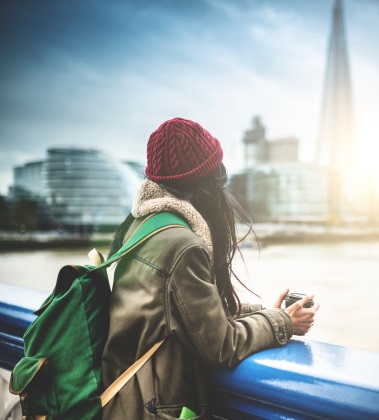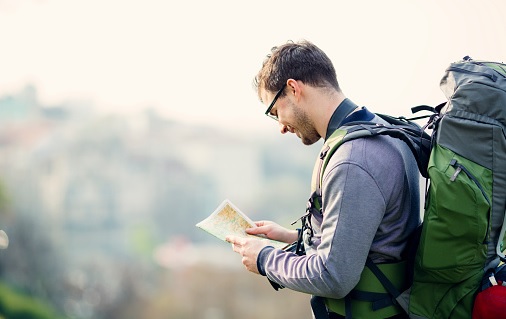(Video: How to Do a Solo Backpacking Trip On a Budget)

For the adventurous and independent folks, backpacking around the world by YOURSELF can be a fun and rewarding experience.
Every person individual should at least travel by themselves once in his or her lifetime. It’s nothing less of a journey to self-discovery, not having your friends there to define you, and in certain a way makes you more mature.
Then again, not many people choose to do so. Why? The answer should be fairly obvious…due to the discomfort or fear of traveling into the unknown, not knowing what to expect, without that security blanket of another person.
Well, change that limiting mindset first. The world is your oyster my friend, with many new friends you have yet to meet around the world. Backpacking solo forces you to put yourself out there to introduce yourself to others, rather than gluing to your same old buddy. You have to rely on yourself, so no leave it to “Jacob or Ashley” to handle the weekend plans.
By backpacking, you can travel alone even on a tight budget, without missing a single thing on your itinerary and without being burdened by heavy luggage and other expenses usually associated with regular accommodations.
Focus on these “3-P’s” that will make you feel like an expert backpacker, if you are a first-timer: planning, preparing, and packing.
Planning
Create a plan. The first step is to determine where exactly you want to go, what specifically you want to see, and where you will stay. Find out where you can find cheap accommodations. Map out the best route to take and determine the length of time it will take to reach your destination. With a sound plan, you will know exactly what to bring and pack for the trip.
Do your research. Consult with other people. You can find a lot of sites and chat rooms online where like-minded people share their backpacking experiences. You can benefit from listening to people’s story on various places; there’s nothing like learning from others’ experiences.
Determine the budget you need and start saving. After creating a detailed travel-plan, save up and set and your budget based on your plan, such as for food, transportation, accommodations, and emergency expenses. It is best to bring some travelers’ checks that you can have reimbursed in case you lose your backpacks.
Preparing
When embarking on a backpacking trip, ask around for the ideal backpack that meets your specific needs and fits comfortably on your back, without being heavy. Try it on for size – when it is fully packed. The rule of thumb is to travel light and bring no more than what you need.
- Anticipate for whatever weather condition you may encounter. Include some overnight stuff and if necessary, a shelter. Bring under garments, footwear, and clothes that you can use for any weather.
- Also pack some food, water bottles, water treatment tablets…the essentials basically. Don’t forget the personal hygiene kit: soap, toothbrush, toothpaste, deodorant, sanitary products, and toilet paper. It should also include your medications, first aid supplies, lotions, mosquito spray, thread, and needle.
- You want to go for light-travel, but no trip is complete if you can’t stay on track nor capture it. Bring a checklist, journal, and pens. Get a miniature video recorder or camera if you want, but in this day and age, a smart phone will be sufficient.
Prepare a checklist of everything you will need.
Packing

After you’re have planned and prepared everything, now you are off backpacking.
Since you’re traveling on limited resources, budgeting is the most crucial thing here. Be resourceful wherever you can, i.e., skip hiring the tour guide.
Thus, the biggest hurdle and highest essential cost on your travel will most likely be “knowing how to get to where you want to go.” You only have yourself to rely on as you can’t always expect to meet “Good Samaritans” along the way to point you in the right direction.
Depending on your planned destination, always have the right tools with you that can help you navigate and get you to where you want to go in the shortest time possible. Have your smart phone with you, as well as power bank, charger, and adaptor handy. These will be helpful in getting directions, as well as getting in touch with the right people should you need help.
On the other, if you are going to places where there is limited or no connection at all like a mountain camp site, do it the old fashion way with a manual compass, local maps, and a pocket almanac.
As much as possible, avoid putting yourself in risky situations, e.g., avoid eating shady things you’re unsure you can handle or getting involved with questionable people. There is nothing that makes you feel ripped-off ending up in a hospital and spending money on something you could have avoided in the first place.
Always keep your safety in mind with the goal to return in one piece, richer in experience. Document your adventures in your journal, and log your daily travel experiences. Take some pictures or videos along the way.
With all these things in mind, you are guaranteed to have the best backpacking adventure of your life – even if you are all by your lonesome and working on a limited budget.

Tempting to go into the Sahara deserts but not sure if tourism approach would be better for any backpacking. Cost more, but safer.
Thanks for the tips. I do agree the hardest about backpacking is willing to something by yourself that must people would want to do with a friend.
The fear is there, but is mostly in your head. The issue then becomes the budget. You can save, but you only have so much cash to spend without a job. Looks like need a huge saving before even attempt something like this.
I want to be able do that!
Hallo, Ich finde den Aufbau der Seite sehr gut. Macht weiter so.